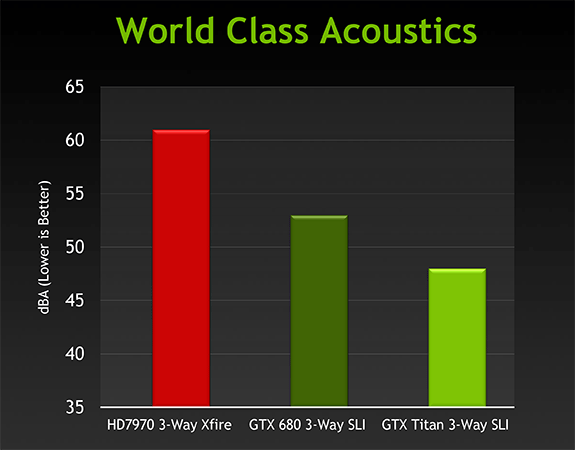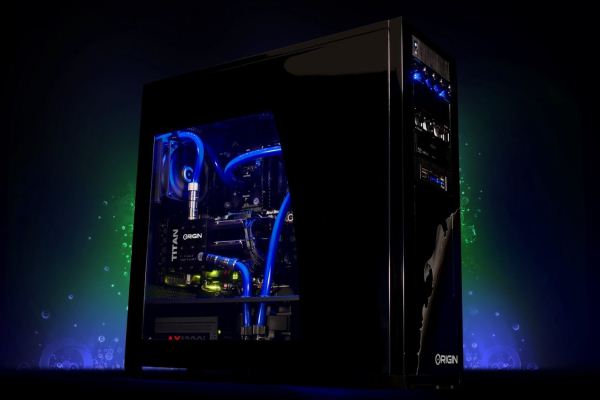NVIDIA's GeForce GTX Titan, Part 1: Titan For Gaming, Titan For Compute
by Ryan Smith on February 19, 2013 9:01 AM ESTOrigin’s Genesis: Titan on Water & More to Come
Wrapping up part 1 of our look at NVIDIA’s GeForce GTX Titan, we wanted to take a quick look at the tri-SLI system NVIDIA sampled to us for this article: Origin’s Genesis. Without the ability to publish performance data we can’t go into any detail and otherwise fully evaluate it, but what we can do is give you a sneak peek at what’s among the most unusual, and likely most powerful Titan systems on the market.
But first, as a bit of a preface, as we mentioned earlier in our article NVIDIA has been sampling reviewers with various SFF and tri-SLI systems to showcase their two boutique computer concepts. With the tri-SLI system it was not only intended to show off raw performance, but also to serve as a showcase of Titan’s build quality. You see, NVIDIA had told us that the acoustics on Titan were so good that a tri-SLI system could not only be a reasonable choice from a background noise perspective, but that it would be notably quieter than even a GTX 680 tri-SLI system, the latter being particularly hard to believe given GTX 680’s impressive acoustics and low power consumption.

Of course, things didn’t exactly go according to plan, and in a happy accident Origin went above and beyond NVIDIA’s original request. As the Genesis’ marquee feature is water-cooling, Origin went all-out in setting up our sample system for water-cooling, and not just on the CPU. Despite the fact that Titan was (and technically still is) an unreleased card, working alongside their waterblock supplier EKWaterBlocks they were able to get proper waterblocks for Titan in time to build our system. As a result our tri-SLI Genesis unexpectedly ended up being both completely water-cooled and factory overclocked.
The bad news of course is that because of the performance embargo we can’t tell you anything about the performance of the Genesis, other than to say that as fast as one Titan card is, three overclocked Titan cards running on water is even faster, sometimes by a massive margin. Furthermore, coupled with this is the fact that GPU Boost 2 was designed in part to better mesh with the superior cooling capabilities of water-cooling, taking advantage of the fact that water-cooled GPUs rarely hit their temperature limits. As a result what’s already a fast system can sustain performance that much higher thanks to the fact that we hit our top boost bins more often.
But we’re getting ahead of ourselves here…
| Origin Genesis Specifications | |
| Chassis | Corsair 800D |
| Processor |
Intel Core i7-3970X Extreme Edition, Overclocked To 4.9GHz, ORIGIN CRYOGENIC Custom Liquid Cooling CPU (6x4.9GHz, 32nm, 15MB L3, 150W) |
| Motherboard | Intel DX79SR |
| Memory | 16GB Corsair Vengeance DDR3 1866Mhz |
| Graphics | 3-WAY SLI NVIDIA GeForce GTX TITAN, ORIGIN CRYOGENIC LIQUID Cooling Solution and Professional Overclocking |
| Hard Drive(s) |
2x120 GB Corsair Neutron SSDs in RAID 0 1TB Western Digital Caviar Black SATA 6.0Gb/s, 7200RPM, 64MB Cache |
| Optical Drive(s) | 12X Blu-ray (BD) Disc Combo |
| Power Supply | 1.2 Kilowatt PSU Corsair |
| Networking | On-Board Intel |
| Audio |
Realtek ALC892 Speaker, line-in, mic, and surround jacks |
| Front Side |
Power button |
| Top Side | - |
| Operating System | Windows 7 Ultimate 64-bit |
| Dimensions |
16.2" x 4.6" x 16" (412mm x 117mm x 407mm) |
| Warranty |
1 Year Part Replacement and 45 Day Free Shipping Warranty with Lifetime Labor/24-7 Support |
| Pricing | MSRP of review system: ~$7000 |
We’ll have more on Thursday, including performance data for what so far is turning out to be a ridiculously fast tri-SLI system. So until then, stay tuned.











157 Comments
View All Comments
CeriseCogburn - Monday, March 4, 2013 - link
lol - DREAM ON about goodwill and maintaining it.nVidia is attacked just like Intel, only worse. They have the least amount of "goodwill" any company could possibly have, as characterized by the dunderheads all over the boards and the also whining reviewers who cannot stand the "arrogant know it all confident winners who make so much more money playig games as an nVidia rep"...
Your theory is total crap.
What completely overrides it is the simple IT JUST WORKS nVidia tech and end user experience.
Add in the multiplied and many extra features and benefits, and that equals the money in the bank that lets the end user rest easy that new games won't become an abandoned black holed screen.
Reputation ? The REAL reputation is what counts, not some smarmy internet crybaby loser with lower self esteem than a confident winner with SOLID products, the BEST of the industry.
That's arrogance, that's a winner, that's a know it all, that's Mr. Confidence, that's the ca$h and carry ladies magnet, and that's what someone for the crybaby underdog loser crash crapster company cannot stand.
Galvin - Tuesday, February 19, 2013 - link
Can this card do 10bit video or still limited to 8bit?alpha754293 - Tuesday, February 19, 2013 - link
Does this mean that Tesla-enabled applications will be able to make use of Titan?Ryan Smith - Tuesday, February 19, 2013 - link
It depends on what features you're trying to use. From a fundamental standpoint even the lowly GT 640 supports the baseline Kepler family features, including FP64.Ankarah - Tuesday, February 19, 2013 - link
Highly unusual for a company to have two of their products at the exact same price point, catering to pretty much the same target audience.I guess it could be viewed as a poor-man's-Tesla but as far as the gaming side goes, it's quite pointless next to the 690, not to mention very confusing to anyone other than those are completely up-to-date on the latest news stories.
CeriseCogburn - Monday, March 4, 2013 - link
Let's see, single GPU core fastest in the gaming world, much lower wattage, no need for profiles, constant FPS improvement - never the same or no scaling issues across all games, and you find it strange ?I find your complete lack of understanding inexcusable since you opened the piehole and removed all doubt.
Voidman - Tuesday, February 19, 2013 - link
Finally somehting I could be excited about. I have a hard time caring much about the latest smart phone or tablet. A new high end video card though is something different all together. And then it turns out to be a "luxury product" and priced at 1k. Cancel excitement. Oh well, I'm happy with my 680 still, and I'm pretty sure I've still got overclocking room on it to boot. But for all those that love to hate on either AMD or Nvidia, this is what happens when one is not pushing the other. I have no doubt what so ever that AMD would do the same if they were on top at the moment.HanakoIkezawa - Tuesday, February 19, 2013 - link
The price is a bit disappointing but not unexpected. I was hoping this would be 750-850 not so I could buy one but so that I could get a second 670 for a bit cheaper :DBut in all seriousness, this coming out does not make the 680 or 670 any slower or less impressive. In the same way the 3970x's price tag doesn't make the 3930k any less of a compelling option.
johnsmith9875 - Tuesday, February 19, 2013 - link
Why not just make the video card the computer and let the intel chip handle graphics???Breit - Tuesday, February 19, 2013 - link
Thanks Ryan, this made my day! :)Looking forward to part 2...